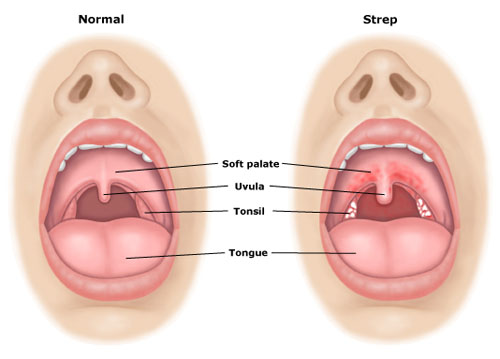Strep throat - symptoms and treatment

What is Strep throat and definition
Strep throat is an INFECTION of the pharynx (throat), also called streptococcal PHARYNGITIS, with various strains of group A beta-hemolytic streptococcal BACTERIA. Strep throat is highly contagious through contact with saliva and requires treatment with ANTIBIOTIC MEDICATIONS to prevent potentially serious complications such as RHEUMATIC HEART DISEASE.
Symptoms of Strep throat and Diagnostic Path
The symptoms of strep throat come on suddenly, usually within five days of exposure to the infection. A characteristic indication of strep throat is the appearance of symptoms without other coldlike symptoms. Only about 5 percent of sore throats (pharyngitis) are strep throat; most sore throats are viral infections. Key symptoms of strep throat include
- FEVER
- moderate to severe throat PAIN
- difficulty swallowing
- HEADACHE
- ABDOMINAL PAIN and VOMITING
- enlarged, painful LYMPH nodes in the neck
- MUSCLE aches and JOINT pain
Symptoms generally peak 48 hours after they first appear. The throat looks very red and may have pockets of pus (white patches or streaks), particularly on the tonsils. However, the throat’s appearance is not diagnostically conclusive. A rapid ANTIGEN test, which produces results in minutes from a swab of the throat, is fairly accurate when positive but inaccurate when negative. A culture of the throat provides definitive diagnosis.
Strep throat Treatment Options and Outlook
Antibiotic medications are necessary to treat strep throat. Because antibiotics do not help viral infections of the throat and because antibiotic-resistant strains of strep are beginning to appear, doctors tend to wait for the throat culture results before prescribing antibiotic medications unless the person has a history of strep throat.
| ANTIBIOTIC MEDICATIONS TO TREAT STREP THROAT | |
|---|---|
| ampicillin | azithromycin |
| cefaclor | cefazolin |
| cefuroxime | cephalexin |
| clarithromycin | penicillin VK |
Most people recover fully with appropriate antibiotic therapy, with symptoms dramatically improved within 48 hours of starting the antibiotic. It is important to take the full course of antibiotic therapy even when symptoms are gone to make sure the antibiotic completely eliminates the strep bacteria. Possible complications of strep throat, which are more likely to occur with delayed treatment or in untreated strep throat, are serious and include PERITONSILLAR ABSCESS, GLOMERULONEPHRITIS (strep infection involving the KIDNEYS), and rheumatic heart disease (strep infection involving the HEART valves).
Risk Factors and Preventive Measures against Strep throat
Strep throat is most common in children between the ages of 5 and 15, though people of any age may acquire the infection. People who have their tonsils have greater risk. Diligent PERSONAL HYGIENE; frequent HAND WASHING; and avoiding the sharing of drinks, foods, and eating utensils among family members or friends are measures that can reduce the risk for exposure to the strep bacteria.
See also ANTIBIOTIC RESISTANCE; MENINGITIS; SCARLET FEVER; TOXIC SHOCK SYNDROME.